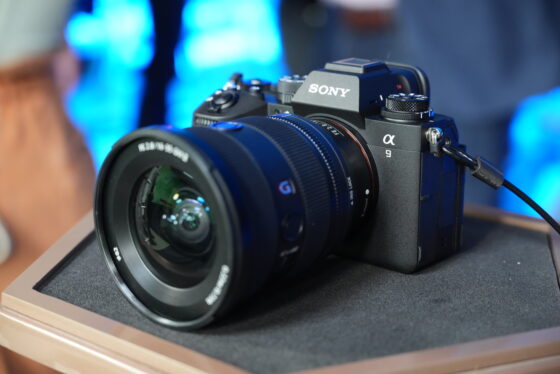Sony has just unveiled its latest pro-oriented mirrorless camera, and we now know why it took them four years to develop it. The Alpha A9 III is the first full-frame camera on the market with a global stacked sensor, a sort of holy grail in the photographic world. It allows for some wild specs, like 120fps shooting speeds with no blackout, up to a 1/80,000th of a second shutter speed and zero rolling shutter — albeit with a 24.6-megapixel resolution that may disappoint some.
The new tech opens up a lot of new possibilities for photographers. Without the constraints of a physical shutter (no, there isn't one), it can shoot full-resolution, blackout-free 14-bit RAW bursts at up to 120fps with a 1.6 second buffer (around 180 shots). Sony also installed the latest Bionz XR image processor and "high-density focal plane phase detection AF" that allows for real-time autofocus (AF) tracking.
"A designated AI processing unit uses real-time recognition AF to recognize a wide variety of subjects with high precision," Sony explains in the press release. "By combining high-speed performance of up to 120 fps with highly accurate subject recognition performance, it is possible to easily photograph scenes and moments that cannot be seen with the naked eye."
The global shutter also allows for shutter speeds of 1/80,000th of a second (1/16,000th during continuous shooting), ten times faster than most cameras. Compatible flashes can be synced all the way up to the maximum shutter speed, rather than being limited to much lower speeds in electronic shutter mode — normally around 1/250th to 1/500th of a second. It also allows the shutter speed to be finely adjusted to eliminate flicker in video. And Sony is offering a 1-second pre-burst feature that can capture scenes before the shutter button is pressed, reducing the possibility of a missed shot.
The stacked global shutter provides large benefits for video, as well. It's Sony's first camera to support 4K 120p video with no cropping and does so with no rolling shutter distortion (skewing), along with 4K 60p with 6K oversampling. It also offers 10-bit recording with S-Log3 capture in all video modes (including 4K 120p), along with S-Cinetone borrowed from the company's high-end Venice lineup that "makes human skin tones and subjects stand out beautifully," Sony said. It should be one of Sony's best-focusing cameras for video, as all the photo subject tracking features work in that mode, too.
It's got a long list of other features you'd expect on a high-end Sony camera, most notably in-body stabilization with up to 8 stops of shake reduction. The electronic viewfinder is Sony's best with 9.44 million dots, and It resolves the rear display tilt vs. flip debate by doing both of those things. And to help clear the buffer as quickly as possible, the A9 III supports fast CFexpress Type A cards on top of SD UHS II, much like the Alpha A1.
Other specs show an ISO range of 250-25600 (expandable to ISO 125–51200) with a minimum ISO that's a bit on the high side. That shouldn't bother photographers on sunny days, given the extremely fast shutter speeds, but video shooters will need ND filters to block some light.
What will be a key for this camera is the image quality and low-light sensitivity, given that this is an all-new sensor and there's not a lot of data on global shutters. Sony didn't release any sample photos yet from what I've seen, so upcoming reviews of this model will be key. The Alpha A9 III goes on pre-order tomorrow for $6,000, with a vertical grip available for $400 — but won't arrive until next spring.
This article originally appeared on Engadget at https://www.engadget.com/the-sony-a9-iii-is-the-fastest-full-frame-camera-ever-thanks-to-a-global-stacked-sensor-175522418.html?src=rss


